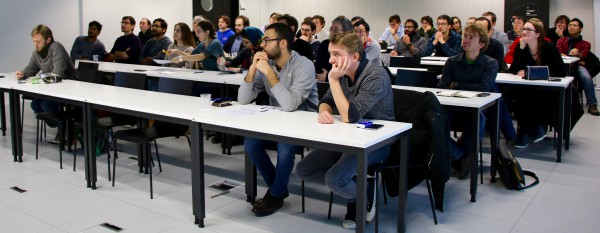MARVEL Junior Seminar — May 2019
The MARVEL Junior Seminars aim to intensify interactions between the MARVEL Junior scientists belonging to different research groups located at EPFL. The EPFL community interested in MARVEL research topics is very welcome to attend. We believe that these events will be central for establishing a vibrant community.
Each seminar consists of two presentations of 25 minutes each, allowing to present on a scientific question in depth, followed by time for discussion. The discussion is facilitated and timed by the chair.
Pizza is served at 11:45 in the MED hall (floor 0), and after the seminar at 13:30 you are cordially invited for coffee and dessert to continue discussion with the speakers.

MARVEL Junior Seminar Organizing Committee — Francesco Ambrosio, Davide Campi, Edgar Engel, Gloria Capano, Michele Pizzochero, Kun-Han Lin, Francesco Maresca and Patrick Mayor
Abstract — Materials Coud: Status quo and future plans
Leopold Talirz1,2, Aliaksandr Yakutovich1,2, Casper Welzel Andersen1, Snehal Kumbhar1, Elsa Passaro1, Marco Borelli1, Berend Smit2, Giovanni Pizzi1, Nicola Marzari1
1 Laboratory of Theory and Simulation of Materials (THEOS), EPFL
2 Laboratory of Molecular Simulation (LSMO), EPFL
Materials Cloud is a key component of the MARVEL Open Science Platform, designed to enable seamless sharing of resources in computational materials science. This includes the archival of structured, curated, or raw data; open source simulation services; data analytics and pre- or postprocessing tools; and educational materials.
Materials Cloud is integrated with AiiDA, a python framework for managing the four pillars of computational science: Automation, Data, Environment and Sharing (ADES). AiiDA manages complex workflows and records the the story of executing a workflow - calculations performed, codes used and data generated - in a graph tailored to include the full provenance of any given result. Sharing an AiiDA graph on Materials Cloud thus provides access not only to the results of calculations, but to every step along the way. The data stored is persistent and citable, implementing the data management practises recommended by major funding bodies. Peers can browse the database interactively, download individual files or the whole database, and start their research right from where the original author left off.
This presentation will focus on practical examples of how MARVEL researchers can take advantage of Materials Cloud today, both with and without AiiDA. I will present plans for future development, taking into account feedback from the Materials Cloud questionnaire (which you are kindly requested to fill out if you haven't already done so).
Abstract — AiiDA lab: an ecosystem to develop, execute and share scientific workflows
Aliaksandr Yakutovich1,2, Leopold Talirz1,2, Casper Welzel Andersen1, Snehal Kumbhar1, Elsa Passaro1, Marco Borelli1, Berend Smit2, Giovanni Pizzi1, Nicola Marzari1
1 Laboratory of Theory and Simulation of Materials (THEOS), EPFL
2 Laboratory of Molecular Simulation (LSMO), EPFL
AiiDA lab provides scientists with a personal workbench to launch, control and analyze simulations in the browser. Tasks are performed by simple, but powerful apps that streamline access to simulation packages and computational workflows, leveraging the ecosystem developed around Project Jupyter as well as the AiiDA framework for provenance tracking [1]. Apps can be installed with a few clicks and are shared via an open App store, thus encouraging the exchange of the scientific know-how encoded in their workflows. Editing apps is straightforward thanks to the underlying jupyter notebook-based interface. Each user workspace runs in an independent Docker container, deployed on the OpenStack facilities at the Swiss National Supercomputing Centre (CSCS).
For users, who prefer to use their own hardware, we provide the Quantum Mobile virtual machine, which not only contains AiiDA lab ecosystem, but also contains a collection of preinstalled simulation softwares, including Quantum ESPRESSO, Yambo, fleur, Siesta, CP2K, Wannier90. All codes are set up and ready to be used through AiiDA, thus stripping away any difficulties associated with compilation, installation and dependencies.
The presentation will start with an introduction to the platform from developer's perspective: motivation, overview of the interface, overview of the technologies behind. Further, I will show some examples of how the platform is used on a daily basis by experimental and computational scientists. Finally, I will discuss the plans for the future development of the platform.
[1] G. Pizzi, A. Cepellotti, R. Sabatini, N. Marzari, and B. Kozinsky, Comp. Mat. Sci 111, 218-230 (2016)
Check the list of the next MARVEL Junior Seminars here.
Low-volume newsletters, targeted to the scientific and industrial communities.
Subscribe to our newsletter